Doug Anthony
John Douglas Anthony, AC, CH, FTSE (born 31 December 1929) is a former Australian politician. Elected to the House of Representatives in 1957, Anthony served as a minister in successive Coalition Governments, and went on to serve as leader of the Country Party from 1971 to 1984, and Deputy Prime Minister under John Gorton, William McMahon and Malcolm Fraser. Anthony is the earliest elected Country MP still alive[1], and along with Ian Sinclair he is the last surviving minister who served in the Menzies Government and the First Holt Ministry.
Doug Anthony AC CH FTSE | |||||||||||||||||||||||||||||||||||||||||||
|---|---|---|---|---|---|---|---|---|---|---|---|---|---|---|---|---|---|---|---|---|---|---|---|---|---|---|---|---|---|---|---|---|---|---|---|---|---|---|---|---|---|---|---|
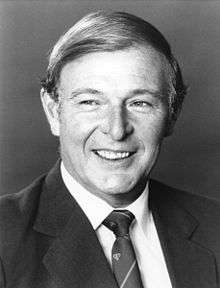 | |||||||||||||||||||||||||||||||||||||||||||
| Deputy Prime Minister of Australia | |||||||||||||||||||||||||||||||||||||||||||
| In office 5 February 1971 – 5 December 1972 | |||||||||||||||||||||||||||||||||||||||||||
| Prime Minister | John Gorton William McMahon | ||||||||||||||||||||||||||||||||||||||||||
| Preceded by | John McEwen | ||||||||||||||||||||||||||||||||||||||||||
| Succeeded by | Lance Barnard | ||||||||||||||||||||||||||||||||||||||||||
| In office 12 November 1975 – 11 March 1983 | |||||||||||||||||||||||||||||||||||||||||||
| Prime Minister | Malcolm Fraser | ||||||||||||||||||||||||||||||||||||||||||
| Preceded by | Frank Crean | ||||||||||||||||||||||||||||||||||||||||||
| Succeeded by | Lionel Bowen | ||||||||||||||||||||||||||||||||||||||||||
| Leader of the National Party | |||||||||||||||||||||||||||||||||||||||||||
| In office 2 February 1971 – 17 January 1984 | |||||||||||||||||||||||||||||||||||||||||||
| Deputy | Ian Sinclair | ||||||||||||||||||||||||||||||||||||||||||
| Preceded by | John McEwen | ||||||||||||||||||||||||||||||||||||||||||
| Succeeded by | Ian Sinclair | ||||||||||||||||||||||||||||||||||||||||||
| Deputy Leader of the Country Party | |||||||||||||||||||||||||||||||||||||||||||
| In office 8 December 1966 – 2 February 1971 | |||||||||||||||||||||||||||||||||||||||||||
| Leader | John McEwen | ||||||||||||||||||||||||||||||||||||||||||
| Preceded by | Charles Adermann | ||||||||||||||||||||||||||||||||||||||||||
| Succeeded by | Ian Sinclair | ||||||||||||||||||||||||||||||||||||||||||
| |||||||||||||||||||||||||||||||||||||||||||
| Father of the Australian Parliament | |||||||||||||||||||||||||||||||||||||||||||
| In office 16 August 1983 – 18 January 1984 | |||||||||||||||||||||||||||||||||||||||||||
| Preceded by | James Killen | ||||||||||||||||||||||||||||||||||||||||||
| Succeeded by | Tom Uren | ||||||||||||||||||||||||||||||||||||||||||
| Member of the Australian Parliament for Richmond | |||||||||||||||||||||||||||||||||||||||||||
| In office 14 September 1957 – 18 January 1984 | |||||||||||||||||||||||||||||||||||||||||||
| Preceded by | Larry Anthony | ||||||||||||||||||||||||||||||||||||||||||
| Succeeded by | Charles Blunt | ||||||||||||||||||||||||||||||||||||||||||
| Personal details | |||||||||||||||||||||||||||||||||||||||||||
| Born | John Douglas Anthony 31 December 1929 Murwillumbah, New South Wales, Australia | ||||||||||||||||||||||||||||||||||||||||||
| Political party | Country Party/NCP/National Party | ||||||||||||||||||||||||||||||||||||||||||
| Spouse(s) | Margot Budd ( m. 1957) | ||||||||||||||||||||||||||||||||||||||||||
| Relations | Larry Anthony, Sr. (father) | ||||||||||||||||||||||||||||||||||||||||||
| Children | Larry Anthony | ||||||||||||||||||||||||||||||||||||||||||
| Occupation | Dairy farmer | ||||||||||||||||||||||||||||||||||||||||||
Early life
Anthony was born in Murwillumbah in northern New South Wales.[2] He was the son of Hubert Lawrence "Larry" Anthony, a well-known Country Party politician. Doug Anthony was educated at Murwillumbah Primary School and Murwillumbah High School, before attending The King's School in Sydney between 1943 and 1946 and then Gatton College in Queensland.[2][3] After graduating he took up dairy-farming near Murwillumbah. In 1957 he married Margot Budd, with whom he had three children: Dougald, Jane and Larry.[2][4]
Political career
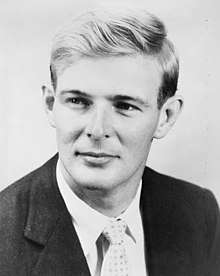
Early career (1957-1964)
In 1957 Larry Anthony Sr., who was Postmaster-General in the Liberal-Country Party coalition government led by Robert Menzies, died suddenly,[5] and Doug was elected to succeed his father in the ensuing by-election for the Division of Richmond, aged 27.[2] He was appointed Minister for the Interior in 1964.
Minister for the Interior (1964-1967)
During his tenure in the Interior portfolio, there were several pushes for Canberra to become independent and self-governing in some capacity.[6]. The Menzies government had not yet established a clear policy for Canberra's future, and Anthony stated that the city was not yet ready for self-governance. At Narrogin in August 1966, Anthony relayed to several rural communities that drought would probably soon sweep the region, and that he was prepared to take precautions to prevent as many negative effects as possible. [7] He was unable to comment on protests that took place outside the Canberra Hotel on 2 February 1967. [8]
Anthony was one of the leading forces against the 1967 nexus referendum, which was seeking to increase the senate's power in parliament. Senator Vince Gair revived the debate around the introduction of such a law in early 1967. Anthony and the County Party decided it would be “unwise” to increase the power of the upper house. [9]
Towards the end of his term as Minister for the Interior, Anthony supported a federal redistribution with conditions so restrictive that it favoured country seats and would increase Country Party representation. Splits within the Liberal and Country coalition were causing such issues to be raised and considered by parliament. These tensions were also fuelled by the narrow majority with which the Liberal Party was returned to power in the 1963 election; without Country Party support they could not have guaranteed parliamentary supply. [10] In 1967 he became Minister for Primary Industry.[2][4]
Minister for Primary Industry (1967-1971)
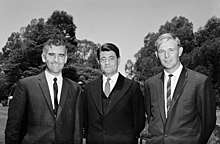
His first speech in this portfolio was made regarding the wheat price in Australia. 1966-67 had yielded a smaller amount than the 1965–66 season, and accordingly the price of what had to be raised.[11] Controversially, in May 1968, Anthony initiated a payout of $21 million to offset the devaluation of the British Pound by Prime Minister Harold Wilson; the currencies were not yet independent of each other. [12] Anthony's popularity in the Industry portfolio was damaged when rural production was down $450 million in 1968 and little change had occurred in the return that farmers were getting for production. [13] Anthony worked with Prime Minister John Gorton to try and create as many economically viable options as possible to deal with the “what crisis”. Eventually quotas were introduced to limit production.[14] When China stopped importing Australian wheat in 1971, Anthony advised against communication with the country, saying it could be “politically and commercially dangerous.[15]
Anthony was made a Privy Councillor by Queen Elizabeth II on 23 June 1971.
Deputy Prime Minister (1971–1972)
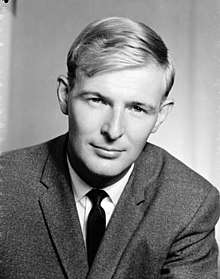
By mid-1969, it was thought that John McEwen, leader of the Country Party since 1958, was going to retire sometime in late 1970. The three members of the party considered to have the greatest chance of succeeding McEwen as leader were Anthony, Shipping Minister Ian Sinclair and Interior Minister Peter Nixon. When John McEwen retired in 1971, Anthony was chosen as his successor, taking McEwen's old posts of Minister for Trade and Industry and Deputy Prime Minister in the government of John Gorton, portfolios he retained under William McMahon. He rescinded McEwen's veto of McMahon as liberal leader and Prime Minister.
When McMahon became Prime Minister in March 1971, only a month after Anthony had taken the Deputy Prime Minister position, he lost power as McMahon disliked Anthony and the two had a poor working relationship. He opposed the revaluation of the Australian dollar by McMahon in 1971–72. In mid-1972, McMahon stopped talking to Anthony and he was oblivious of many decisions that were occurring outside cabinet. When McMahon announced the 1972 election, he left Anthony in the dark and he was unaware of the date on which it would take place and the campaign techniques the coalition would use. Anthony called the Prime Minister of New Zealand, Keith Holyoake, to find out the date, as McMahon had only informed three people of the date before approaching the Governor-General. Anthony lost faith in the government and became complacent about the defeat which became obvious in the lead up to the election in December 1972.[16]
Opposition (1972–1975)
After McMahon's defeat in 1972, Anthony was said to favour a policy of absolute opposition to the Labor government of Gough Whitlam. Despite this, the Country Party voted with the Labor Government on some bills, for example the 1973 expansion of state aid to under-privileged schools. He changed the party's name to the National Country Party and began contesting urban seats in Queensland and Western Australia. Under his leadership, the Country Party's relationship with production industry was weakened. [17] Anthony criticised Whitlam for not giving enough aid to Papua New Guinea in 1975. [18]
Deputy Prime Minister (1975–1983)
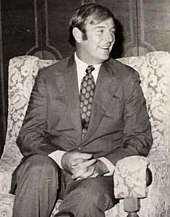
Anthony had a much better working relationship with Fraser than he did with Billy Snedden.[19] At first, Anthony did not support Snedden's or Fraser's decisions to block parliamentary supply from the Labor Party, beginning in October 1975. He was soon convinced.[20] The Coalition was confirmed in power at the 1975 election, with the biggest majority government in Australian history. Anthony again became Deputy Prime Minister, with the portfolios of Overseas Trade and National Resources (Trade and Resources from 1977) under Malcolm Fraser.[4] From 1975–80, Anthony found that he did not have the same power he had possessed before the 1972 election, as the Liberal Party had started gaining government in its own right.
Anthony was noted, while Prime Minister Fraser took annual Christmas holidays, for governing the country as Acting Prime Minister from a caravan in his electorate of Richmond.[21]
In 1976, during his second term as Deputy Prime Minister, Anthony began a strong import and export relationship with Japan, particularly over oil. [22] Anthony supported the mining and export of Australian uranium, and believed it would be an essential part of the future economy. [23] While Acting Prime Minister in July 1976, he was the first user of the Papua New Guinea-Cairns telephone line, speaking to Acting Prime Minister Sir Maori Kiki. [24] While Acting Prime Minister in July 1979, he threatened to shut down an industrial strike in Western Australia, stating the issue had to be resolved. The Labor Party was strongly opposed to this action and called his power as Acting Prime Minister into question. [25] After Fraser lost office in 1983, Anthony remained as party leader (now named the National Party since 1974). The last major move as leader of the National Party that Anthony made was to explain the tensions between the Liberal and National parties in Queensland, who officially opposed each other in the October 1983 election. [26]
Retirement
Anthony remained in parliament for less than a year before retiring from politics in 1984. By then, although only 55, he was the Father of the House of Representatives. He returned to his farm near Murwillumbah and generally stayed out of politics.[27] In 1996 his son Larry Anthony won his father's old seat,[28] creating the first three-generation dynasty in the House of Representatives.
In 1994, Anthony appeared in a documentary series about the Liberal Party in which he revealed that McMahon had refused to tell him beforehand the date of the 1972 election despite Anthony being the Country Party leader. During 1999 Anthony spoke in support of Australia becoming a Republic.[29]
Honours
In 1981 Anthony was appointed a Companion of Honour (CH).[30] In 1990, he was awarded the New Zealand 1990 Commemoration Medal.[31] In 2003 he was made a Companion of the Order of Australia (AC) for service to the Australian Parliament, for forging the development of bi-lateral trade agreements, and for continued leadership and dedication to the social, educational, health and development needs of rural and regional communities.[32]
References in popular culture
Anthony's name was used by the anarchic Canberra comedy trio the Doug Anthony All Stars, who rose to fame with celebrated appearances at the Edinburgh Festival Fringe in the 1980s and came to national prominence in Australia in 1990 with their performances on the TV comedy series The Big Gig and their own 1991–92 series DAAS Kapital.
See also
References
- Malcolm Farnsworth (2020). "Living Former Members Of The House Of Representatives (1949-1972)".
- "John Douglas Anthony (1929– )". Australian Broadcasting Corporation. 14 December 2004. Archived from the original on 18 January 2010. Retrieved 22 January 2010.
- Juddery, Bruce (7 May 1969). "A shrewd brain ticks behind the boyish grin". The Canberra Times. p. 17.
- "Doug Anthony". Parliamentary Handbook. National Archives of Australia. Retrieved 24 January 2010.
- "Hubert Lawrence Anthony (1897–1957)". Australian Broadcasting Corporation. 14 December 2004. Retrieved 22 January 2010.
- Canberra Times, 18 August 1964
- Beverley Times, 19 August 1966
- Canberra Times, 3 February 1967
- Canberra Times, 28 February 1967
- Canberra Times, 12 September 1967
- Beverley Times, 22 March 1968
- Beverley Times, 3 May 1968
- Beverley Times, 2 August 1968
- Canberra Times, 15 April 1969
- Papua New Guinea Post-Courier, 11 June 1971
- [The Liberals (1994), Episode 2, Part 3 (1:17-3:20)
- Sydney Tribune, 3 December 1975
- Papua New Guinea Post-Courier, 14 August 1975
- Sydney Tribune, 1 April 1975
- Canberra Times, 20 April 1974
- Doug Anthony Address at the 1974 National Party Conference
- Papua New Guinea Post-Courier, 9 February 1976
- Papua New Guinea Post-Courier, 31 March 1976
- Papua New Guinea Post-Courier, 23 July 1976
- Papua New Guinea Post-Courier, ?? July 1979
- Canberra Times, 1 November 1938
- "Honorary awards". The University of Sydney. 14 November 2009. Retrieved 22 January 2010.
- "Lawrence James Anthony (1961– )". Australian Broadcasting Corporation. 14 December 2004. Retrieved 22 January 2010.
- "Anthony, John Douglas, Companion of Honour". It's an Honour. Retrieved 24 January 2010.
- Taylor, Alister; Coddington, Deborah (1994). Honoured by the Queen – New Zealand. Auckland: New Zealand Who's Who Aotearoa. p. 48. ISBN 0-908578-34-2.
- "Anthony, John Douglas, Companion of the Order of Australia". It's an Honour. Retrieved 24 January 2010.
| Parliament of Australia | ||
|---|---|---|
| Preceded by Hubert Lawrence Anthony |
Member for Richmond 1957–1984 |
Succeeded by Charles Blunt |
| Political offices | ||
| Preceded by John Gorton |
Minister for the Interior 1964–1967 |
Succeeded by Peter Nixon |
| Preceded by Charles Adermann |
Minister for Primary Industry 1967–1971 |
Succeeded by Ian Sinclair |
| Preceded by John McEwen |
Deputy Prime Minister of Australia 1971–1972 |
Succeeded by Lance Barnard |
| Preceded by Gough Whitlam |
Minister for Trade and Industry 1971–1972 |
Succeeded by Jim Cairns |
| Preceded by Frank Crean |
Deputy Prime Minister of Australia 1975–1983 |
Succeeded by Lionel Bowen |
| Minister for Overseas Trade/ Minister for Trade and Resources 1975–1983 | ||
| Preceded by Ken Wriedt |
Minister for National Resources 1975–1977 |
Merged into Trade and Resources portfolio |
| Party political offices | ||
| Preceded by Charles Adermann |
Deputy Leader of the Country Party of Australia 1966–1971 |
Succeeded by Ian Sinclair |
| Preceded by John McEwen |
Leader of the Country/National Country/National Party of Australia 1971–1984 | |
| Honorary titles | ||
| Preceded by Sir James Killen |
Father of the House of Representatives 1983–1984 |
Succeeded by Tom Uren |